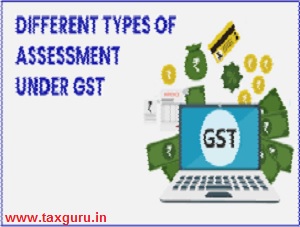Assessment Under GST Section-59 Self Assessment
Overview
-GST was introduced on 01st July 2017, It has been around 3.5 years, since its beginning every taxpayer had option for self assessment to rectify for any mistake or error done while complying with the provisions of GST Act & Rule made there under as per section-59 Self Assessment.
-Assessment means determination of tax liability under this Act and includes self-assessment, re- assessment, provisional assessment, summary assessment and best judgment assessment
Assessment under GST Act can be done under following 6 sections.
- 59. Self-assessment
- 60. Provisional assessment
- 61. Scrutiny of returns
- 62. Assessment of non- filers of returns
- 63. Assessment of unregistered persons
- 64. Summary assessment in certain special cases
Section 59- Self Assessment
Let Us discuss and understand provisions under
Section 59- Self Assessment
Self-assessment means an assessment by the registered person himself and not an assessment conducted or carried out by the Proper Officer.
Hence, every registered person would be required to assess his tax dues in accordance with the provisions of GST Act and report the basis of calculation of tax dues to the tax administrators, by filing periodic tax returns.
Definition of Proper officer is provided under Section 2(91) of the CGST Act, 2017,
a “proper officer” in relation to any function to be performed under this Act, means the commissioner or the officer of the central tax who is assigned that function by the Commissioner in the Board;
Section 39(9) of CGST Act, 2017
Relevance of Section 39(9)
- For understanding Self Assessment under GST Act, it is important to analysis section 39(9) CGST Act 2017, which states that Subject to the provisions of sections 37 and 38, if any registered person after
- Furnishing a return discovers any omission or incorrect particulars therein, other than as a result of scrutiny, audit, inspection or enforcement activity by the tax authorities,
- He shall rectify such omission or incorrect particular, subject to payment of interest under this Act.
- Provided that no such rectification of any omission or incorrect particulars shall be allowed after the due date for furnishing of return for the month of September or second quarter following or the actual date of furnishing of relevant annual return, whichever is earlier.
Circular No. 26/2017 dated 29.12.17
- Para 4 of Circular No. 26/2017 dated 29.12.17, explains how to do rectification for any mistake done during GST return filing,
- It clarifies that in case of summary returns like GSTR-3B, where there are no separate tables for reflecting tax effects of amendments for past periods are available, the figures pertaining to the current month can be adjusted for past month amendments, so long as the amount is not negative.
These provisions strongly encourage the concept of self- assessment.
Points to be taken care of during Self Assessment
♦ As per Section-59 Self Assessment, Taxpayer can exercise liberty to assess tax liability voluntarily with the perils of interest and penalty for any miscalculations or misinterpretations without taking the place of the role of Proper Officer.
♦ Experts are of the view that taxpayer must submit to the jurisdiction of Proper Officer to examine and sanction refund in case the tax charged to customer is in excess by filing a refund application and not merely when the errors is in reporting in GSTR 1 and 3B and not in tax invoice issued to customer.
♦ It is on this premise that experts opine that ANX-1 containing instructions that ‘tax dues admitted in ANX-1 will be liability under the Act’ may not be entirely in accordance with law.
♦ The point therefore is about the ‘limits’ to this liberty of self-assessment cannot be lost sight of while complying with GST. Self-assessment does not mean ‘unsupervised self-administration’.









